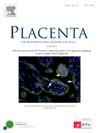Maternal immune activation elicits rapid and sex-dependent changes in gene expression and vascular dysfunction in the rat placenta
IF 3
2区 医学
Q2 DEVELOPMENTAL BIOLOGY
引用次数: 0
Abstract
Introduction
Maternal immune activation (MIA), characterized by increased circulating inflammatory mediators during pregnancy, is associated with adverse pregnancy outcomes and neurodevelopmental deficits in offspring. These health outcomes often manifest differently depending on fetal-placental sex. A well-established model of MIA involves administration of a viral mimetic, polyinosinic:polycytidilic acid (PolyI:C), to pregnant rodents. Placental responses to PolyI:C contribute to the detrimental effects of MIA on offspring, but these responses have not yet been well characterized. In the present study, we profiled acute gene expression changes in male and female placentas following PolyI:C administration to pregnant rats during late gestation.
Methods
Pregnant rats received 4 mg/kg PolyI:C or saline intravenously on gestational day 18.5, and tissues were harvested 4–5 h later. Gene expression profiling on placental tissue was performed. Enzyme immunoassays and immunohistochemistry were conducted to determine levels of select proteins in maternal blood and placental tissue, respectively.
Results
Maternal PolyI:C exposure caused a robust increase in levels of inflammatory mediators in maternal blood and placental tissue. There were more genes differentially expressed in female placentas after PolyI:C exposure (765) than male placentas (221), including reduced expression of genes associated with maternal-fetal communication. Placentas also had increased expression of genes linked with vascular dysfunction after PolyI:C-induced MIA.
Discussion
PolyI:C elicited a powerful inflammatory response in the placenta along with vascular dysfunction, likely contributing to the adverse pregnancy outcomes triggered by MIA. Female placentas responded to PolyI:C more vigorously than male placentas, which could underlie the differential outcomes of MIA depending on sex.
母体免疫激活引起大鼠胎盘中基因表达和血管功能障碍的快速和性别依赖性变化
母体免疫激活(MIA),以妊娠期间循环炎症介质增加为特征,与不良妊娠结局和后代神经发育缺陷相关。这些健康结果往往表现不同,取决于胎儿-胎盘性别。一个成熟的MIA模型涉及给怀孕的啮齿动物注射一种病毒模拟物多肌苷:多胞二酸(PolyI:C)。胎盘对PolyI:C的反应有助于MIA对后代的有害影响,但这些反应尚未得到很好的表征。在本研究中,我们分析了在妊娠后期给孕大鼠注射PolyI:C后雄性和雌性胎盘的急性基因表达变化。方法妊娠大鼠于妊娠第18.5天静脉注射4 mg/kg poly:C或生理盐水,4 ~ 5 h后采集组织。对胎盘组织进行基因表达谱分析。采用酶免疫法和免疫组化法分别测定母体血液和胎盘组织中选定蛋白的水平。结果母体暴露于多聚丙酸引起母体血液和胎盘组织中炎症介质水平的显著增加。PolyI:C暴露后,女性胎盘中差异表达的基因(765个)多于男性胎盘(221个),包括与母胎交流相关的基因表达减少。PolyI: c诱导MIA后,胎盘中与血管功能障碍相关的基因表达也有所增加。polyi:C在胎盘中引起强烈的炎症反应,并伴有血管功能障碍,可能导致MIA引发的不良妊娠结局。女性胎盘对PolyI:C的反应比男性胎盘更强烈,这可能是MIA因性别而导致的不同结果的基础。
本文章由计算机程序翻译,如有差异,请以英文原文为准。
求助全文
约1分钟内获得全文
求助全文
来源期刊

Placenta
医学-发育生物学
CiteScore
6.30
自引率
10.50%
发文量
391
审稿时长
78 days
期刊介绍:
Placenta publishes high-quality original articles and invited topical reviews on all aspects of human and animal placentation, and the interactions between the mother, the placenta and fetal development. Topics covered include evolution, development, genetics and epigenetics, stem cells, metabolism, transport, immunology, pathology, pharmacology, cell and molecular biology, and developmental programming. The Editors welcome studies on implantation and the endometrium, comparative placentation, the uterine and umbilical circulations, the relationship between fetal and placental development, clinical aspects of altered placental development or function, the placental membranes, the influence of paternal factors on placental development or function, and the assessment of biomarkers of placental disorders.
 求助内容:
求助内容: 应助结果提醒方式:
应助结果提醒方式:


